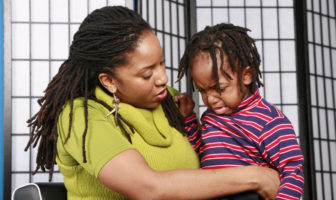Check out this list of favorite books for Black History Month (and anytime!) from Reading Rockets. Some describe different histories while others show the joys and challenges that are shared by all children as they learn and grow.

Your Child Just had a Tantrum in Public: The Debrief
The tantrum may come unexpectedly after a great day out as a family; other times, a rocky day gets worse, and your child’s outburst feels like one last thing you must handle. Whatever the circumstance, fielding a tantrum in public causes stress for any parent. Here are a few steps that help reset and move forward once the tantrum ends.
Be Kind to Yourself
Although your child struggled with difficult emotions, it was probably a challenging moment for you too—so take care of yourself. If a co-parent or trusted adult is unavailable to care for your child and give you a break, something as simple as going into the bathroom (make sure any babies are secured in a playpen or similar for safety) to be alone and taking several slow deep breaths will help bring you back to center. Try not to be too hard on yourself – you are not a bad parent, and this happens to every parent at some point.
Reflect on the Circumstances
Take your time with the first step. When you feel more grounded and ready to proceed, consider what was going on with your family and the environment before the tantrum occurred. Was your child tired, hungry, or thirsty? Was the environment crowded or perhaps overstimulating? Remember that children have less ability than adults to persevere when in situations they find scary or challenging. Breaking down and throwing a tantrum, a typical behavior for kids, is their way of signaling for help. If you can identify what might have triggered this behavior, there may be a way to minimize it the next time. Also, consider how you felt – were you tired, hungry, thirsty, or stressed? Your child may pick up on your change in emotions or attitude, so it is worth being in tune with this and making sure you feel good whenever possible.
Try not to be too hard on yourself – you are not a bad parent, and this happens to every parent at some point.
Talk to Your Child
Talking to your child after a tantrum gives you the chance to do a few things.
First, you will show your child that you care about their feelings. You can ask some older children what upset them or what feelings they had before acting out. Remember that children may not know the words to describe their emotions, so you may get only pieces of an answer, or they may be happier drawing a picture. Reassure them that it is ok to have and describe these feelings as sometimes children learn that they should hide anger, sadness, or frustration.
Second, you will have a chance to address your behavior. Ideally, as parents, we would respond to our child’s tantrums with a calm voice and patience. However, sometimes our own emotions get the best of us. Did you find yourself yelling at your child or being forceful with them? This is a good opportunity to tell your child directly: “I know I raised my voice /hit/ responded to you in a harsh way earlier. I was having my own big feelings, but it is my job as a parent to take care of you and make you feel safe. I am sorry.” Let them express how they felt about your reaction. This part is challenging as a parent, so take deep breaths if your child reports that they felt scared or upset. You are doing a wonderful thing by letting them have a full range of emotions with you.
Third and lastly, you can strategize with your child how to handle these feelings and situations in the future. This is a great time to explore with your child what they were feeling before the tantrum – did they feel anxious or upset? Children may know this as a bodily feeling, such as an upset tummy or a tingly feeling on the back of their neck. You can come up with a signal together, maybe a secret password or a sign like squeezing your hand three times, that means they are feeling those big feelings and need to leave the public environment to calm down. For this to work, your child must trust that no matter what is going on, if they give you the signal, you’ll protect them and promptly remove them from that setting. Practice saying, “Excuse me just one minute. We’ll be right back,” so that no matter who might be around, you will advocate for your child.
Take some deep breaths again. The tantrum has happened, but now it’s time to team up with your child and find ways for everyone to move forward while feeling supported.




